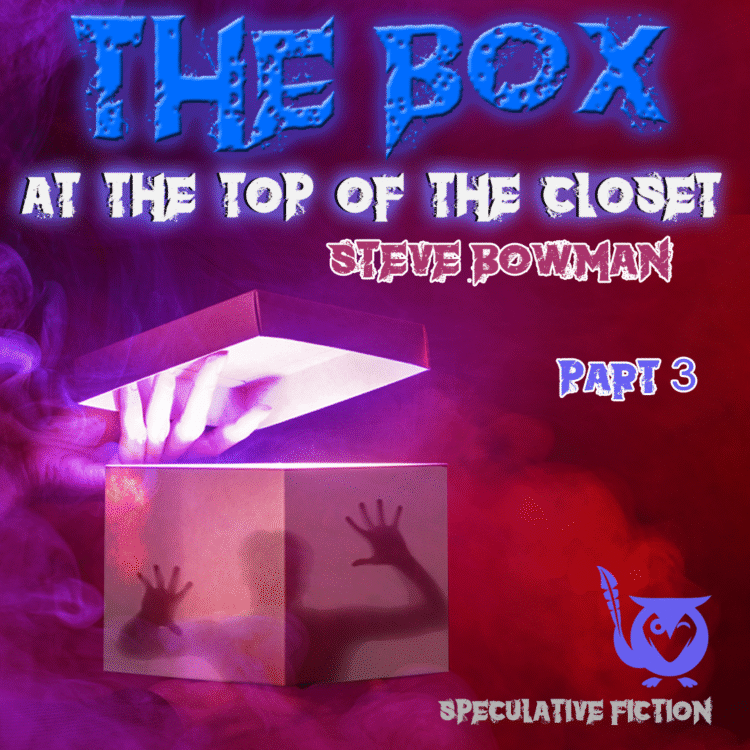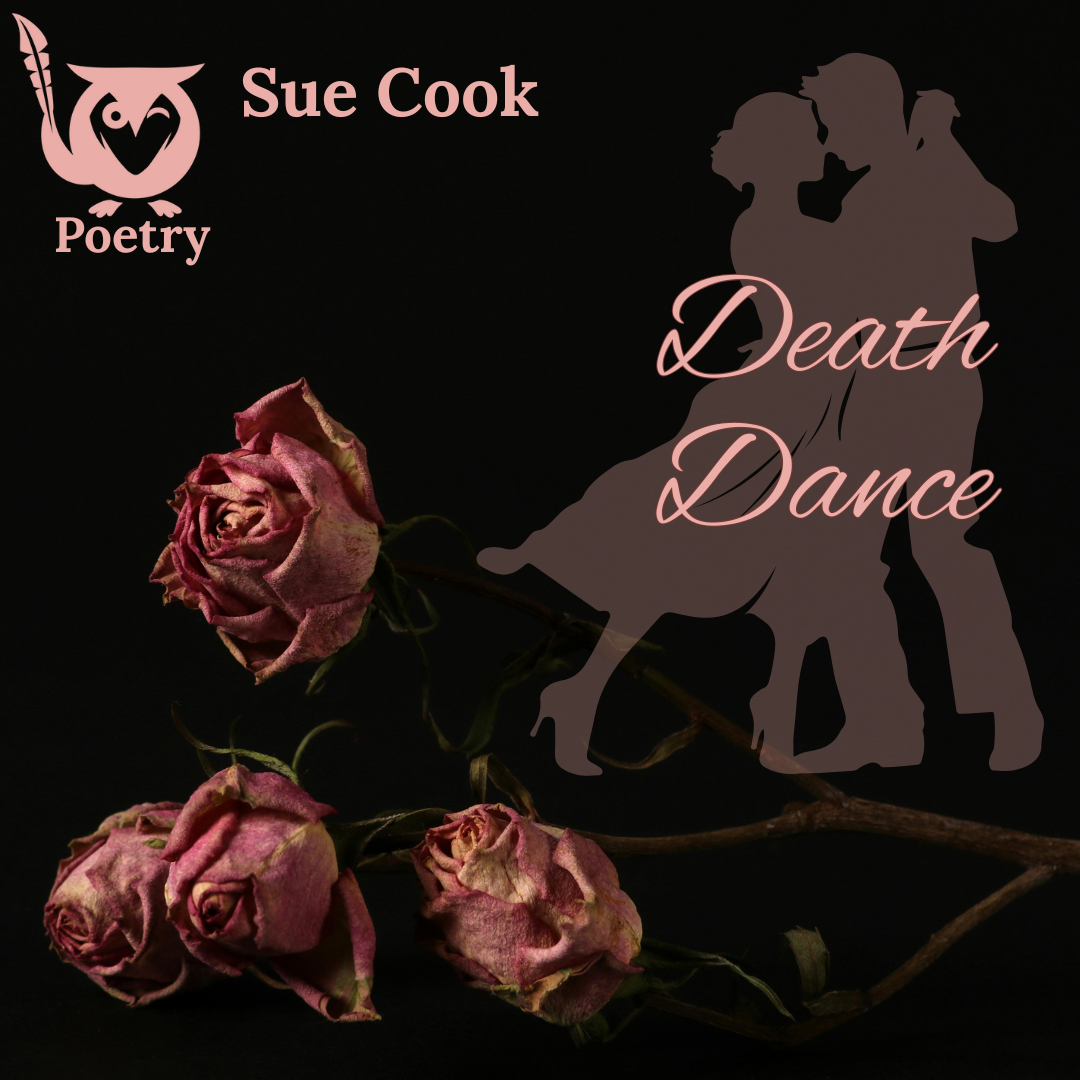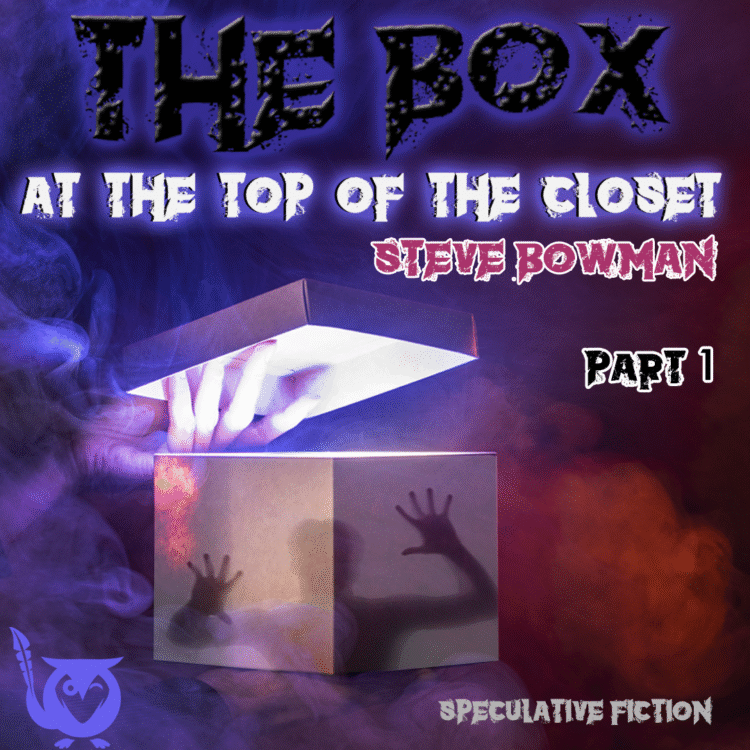Trigger Warning: This piece contains violence, mental health trauma, and animal harm. Sensitive readers should exercise caution.
This story is part of a three-part series. Read Part 1 first.
Eric’s days had become a maddening search of his memory for any encounter or friendship or event that involved a tall, blue-eyed, brown-haired man. He came up blank every time. He didn’t recognize the man’s face, and he had yet to hear the man’s name in his dreams.
Eric didn’t think it could be a dream representation of himself — he’d never owned a dog or lived in the country or had a father to yell at him in the middle of the night. It was a fearful conundrum. For the first time, he felt fear and suspicion about that little black box. He’d considered it a benevolent presence at the top of the closet, a kind of safe space.
Now it felt like a stranger living in his home, kidnapping him at whim for a joyride in terror.
Eric also wondered if he’d been drugged, or if a secret squatter had come out of hiding to manipulate him. Maybe the squatter had found a way to hypnotize him while he slept, and this was all a suggested vision.
Those thoughts kept him awake for two days. He could barely function at work, nodding off in his cubicle so often that when one of his managers wandered by, they suggested he take the day off to get some rest. But once home, Eric sat on a chair in the long hallway running down the center of his house, and stared at the closed closet door.
He had never closed it before, not since he’d first found the box up there. But now he considered boarding it up with nails or extra padlocks. Maybe a deadbolt. How many did he need, he wondered. And what if the squatter didn’t come from that closet, but had holed up in some other space he hadn’t considered?
What if there were several squatters, hiding in all the dark places of the house? Should he call the police? Buy a gun? That’s when he remembered that he had stood in front of a pawn shop window that afternoon, staring in almost longingly. But how long he had been standing there, or when he had first pulled over and gotten out of his car to look, he couldn’t say.
A bright green starburst sign had announced their seasonal clearance sale — all their summer gear was going for fifty to seventy-five percent off. There, amidst coolers, croquet sets, and swimming goggles, was a baseball mitt and an old, worn baseball bat.
Eric had blinked, looked down, and seen his wallet in his hands with his fingers counting the bills inside. With an unsettled glance over his shoulder, he’d pushed the wallet into his pocket and walked back to his car.
Uneasy with all these experiences, Eric now propped himself up in a corner of the well-lit living room. He hoped he might stand there without falling asleep — it was away from all the closets, and out of reach of shadows.
But his eyelids flickered, and he found himself in the center of a hot, sun-drenched colonnade surrounded by thousands of men dressed in robes of red, purple, or blue. Every one of them wore a pointed bishop’s mitre.
Many of these bishops stood and shouted at others across the columned chamber. They waved their arms and gesticulated furiously until bishops on the other side shouted them down. The whole proceeding reminded Eric of a session of British parliament he’d watched on TV several years ago.
But he couldn’t understand their language, so he turned his attention to his other senses.
The smells overwhelmed him: Though these bishops appeared to be conducting business, the rows of bodies were punctuated by tables of food. Heaps of it. Meats and fruits and nuts and breads, with servants whisking bits and pieces away and replacing them with new steaming platters every few minutes.
Eric watched steam roll up, further heating the sunny room. His mouth watered as the exotic spices filled the air. Then, as his eyes travelled from one platter to another, he saw other sources of smoke.
At the front of each aisleway stood great, flaming braziers, tended by additional servants. He watched as they worked in teams at each brazier: One would stoke the fire underneath, then the other would open an urn and scoop some powder to place into the center of the brazier — great, heaping mounds of powder.
There must have been larger flammable bits mixed in because the mixture would pop and crackle and send up embers with each scoop. And the aroma! The deep, musky, peppery smell mixed with notes of pine so instantly overwhelmed Eric that he gagged.
He stifled a cough to avoid detection, but then wondered if they could even see him — either he was invisible, or they were so wrapped up in their debate that they didn’t care who wandered the aisles.
Then one wandering person bumped into him, and Eric realized just why they used so much incense. The man smelled as if he had never bathed. He smelled of rotting food, old sweat, piss, and shit.
Eric felt an overwhelming urge to vomit, but a gust of wind sent waves of food steam and incense vapors back around him, and the combination intoxicated him. Then the shouting in the chamber escalated, and he turned his attention back to the bishops.
Several of them had dragged a framed canvas painting, as large as the men carrying it, to the center of the chamber. An image of Jesus gazed up from it, but his eyes bore an exaggerated almond shape, and his body stretched in a stylized, otherworldly “T” shape over a thin cross.
Two of the men struggled to hold it up, while three others shouted and waved their arms furiously between the crowd and the painting. The room seemed to erupt like a tidal wave as group after group of men shouted louder than the last. Some tore their robes; others threw their mitres to the ground.
Then the floor shook. Eric thought at first that the rioting bishops had caused it, but they all paused too. A cacophonous, thundering boom broke the air above the painting. The men holding the painting let it drop to the floor as they fled. A fiery, ever-widening portal of light opened; flaming golden wings emerged and beat against its entire circumference.
Along the ridges of the wings, hundreds of bright, sapphire-blue eyes opened and glanced from one person to the next, searching the room. Eric trembled, wondering if they were looking for someone specific. Maybe him? Just as he had begun to look for a place to hide, he saw the eyes focus.
In a single motion, the hundreds of eyes locked onto the fallen painting and made a collective blink. The painting rose from the ground into the air beside them.
Clouds roiled out of the brilliant circle, undulating to form a white ground beneath it and filling the air with myriad floral aromas.
Then a woman with bare feet stepped through the wreath of burning wings to stand on the clouds. She wore white robes and a blue veil, all of it trimmed with shimmery red satin.
Most in the room fell to their knees in deep genuflection as they murmured. But some, especially those closest to the apparition, ran forward, waving their arms as if trying to disperse the clouds. When their arms touched the ambrosial mass, they were flung backwards to land sprawling on their backs, the air audibly forced from their bodies.
Looking down on the fallen and genuflecting men, the woman spread her arms and announced, “You stand here arguing about words that offend you rather than seeing the sacred drama you’re attempting to recreate!”
Eric’s eyes widened and he felt his breath catch. How could he understand her?
“Remember!” she said. “When you perform this passion, no matter the roles you cast yourselves in, these words are real, even if they offend you, even if you disagree with them. They are the truth. They are the words said by those people in that time. Their truth cannot be changed.”
She turned, shifting her gaze from the roomful of bishops to the painting floating above her. The frame and canvas burned away in the blazing clouds, leaving the crucified Jesus.
But this image also shifted. It shimmered in and out of focus; the body undulating, breathing, morphing to wear blue jeans, a T-shirt, and flannel shirt. Now a curly-headed young man hung tied, arms outstretched, to a barbed wire fence on the edge of a dusty old town, unseen cattle lowing in the distance.
“If you don’t want to say the words, you do not need to tell the story,” the woman continued. “Don’t change it to suit your sensibilities. Honor the truth!”
With a thunderous flash of light, Eric awoke face down on his living room floor, confused and crying. It had been nearly 20 years since he had attended a Catholic church — or any church, really — so he had no idea why he had witnessed such incongruous orthodoxy.
He turned over and slept fitfully on the floor until morning. Then he dressed for work, hoping he could forget his confusion somewhere during the day.
But he didn’t lose it.
It weighed on him. He tried to work, but numbers and letters blended together, or worse, brought up memories from the dream sequences. To avoid the confusion and anxiety of it all, he gave in to the brain fog, laid his head on his desk, and slept.
He felt betrayed by the great, dreaming November. All his language practice had backfired on him; these dreams were nonsensical nightmares.
At lunchtime, two of Eric’s managers wrote him up for sleeping on the job.
“We’re not paying you to sleep,” both said. “Stop partying, or go to bed earlier, or do whatever you need to do to come in here and get your work done.”
Eric’s shoulders slumped. He had several sick days stockpiled, so he chose to take a four-day weekend, starting right then, rather than risk getting fired. But would it work?
He felt out of sorts. He wanted to avoid sleeping in the house if he could, but he needed sleep, and he had no friends to ask for help. He loathed the thought of roach-infested motels and their dirty, starched sheets. Unable to think of other feasible options, Eric began to drive around the city.
The sky was bright and clear instead of the usual gray November pall, and he convinced himself that if he rolled the windows down, the bracing air would keep him awake.
It seemed to work at first. He looped about the city for several hours, even stopping for gas and a soda pop at one point. But by early evening, the lengthening shadows seemed to pull at his eyelids. Several times car horns woke him only just in time to avoid a collision.
Those intermittent moments of adrenaline sufficed to keep him awake for 20 to 30 minutes at a time. Stopping to walk around and urinate bought him another 45 minutes or so of wakefulness. He even turned up the radio as loud as it would go.
But sometime after midnight everything went black. Eric didn’t so much know this as he felt it, like wet clothes after falling in a lake. He felt the movement of the car, the cold air whipping through the car windows, and the thumping bass of the song playing on the car radio. But he felt an otherness taking hold.
It was as if the night was holding him and singing to him. A lullaby. A mantra.
Busted back
Broken neck
Darkness calls me
Echoes in my skull
This ain’t where I belong
Monsters under the bed
My childhood delusions
Melt like mercury rain
In the darkness of my fucking head
Lost my days
Like blackouts
Like memories
Reverb in my head
This ain’t where I belong*
And then the music and the wind and the motion stopped, and the darkness turned into streetlamps and porch lights. Eric found himself outside his car, standing on the curb, staring at an unfamiliar house with lights that burned like torches on either side of the front door, and glowing windows upstairs and down.
He glanced around, searching the empty street. He had no idea how long he’d been standing there or who had seen him. Had anyone reported him? He opened the passenger door and slid as silently as possible across his front bench seat before gently pulling the door closed behind him.
He checked his watch, then stared at it. Two days had passed since he began his drive! How could one lose two days? Then he turned on the radio to a news station, and heard it confirm the date and time. His hands shook, but he couldn’t risk getting caught loitering any longer. Eric started the car and began to drive.
But when he looked at the road signs on the street corner, he did not recognize the street names. After driving another five blocks, he realized he had no idea where he was. It took another fifteen minutes before he found a gas station, and in there, a map. His mouth dropped open. He was a whole state from home — a five-hour drive.
Somehow, he made it back without further mysterious detours. Sleep at home, he’d decided, was better than another uncharted drive. He shoved open the front door, ate an old, stale cookie, then walked straight to the guest bedroom and fell asleep crossways on the bed.
And no sooner did his body land on the bed than he awoke in the dark otherness once more.
To be continued in Part 3…
*Lyrics written by Rita Mock-Pike
Here’s some other pieces to read next!
- The Night You Wanted Money – Flash Fiction
- Divergent Memory of a Burning Heap – Personal Essay
- The Sleeper of R’Lyeh – Speculative Fiction Magazine Issue
- The Muse of Self-Destruction – Dark Poetry

Steve Bowman
Steve Bowman’s work has previously appeared in The Legacy, Amarillo Bay, The Zen Space, Last Leaves, Southern Arizona Press, and Wicked Shadow Press. When not writing, Bowman seeks inspiration in the trees and hills of Southern Indiana with his little dog, Grummle.





